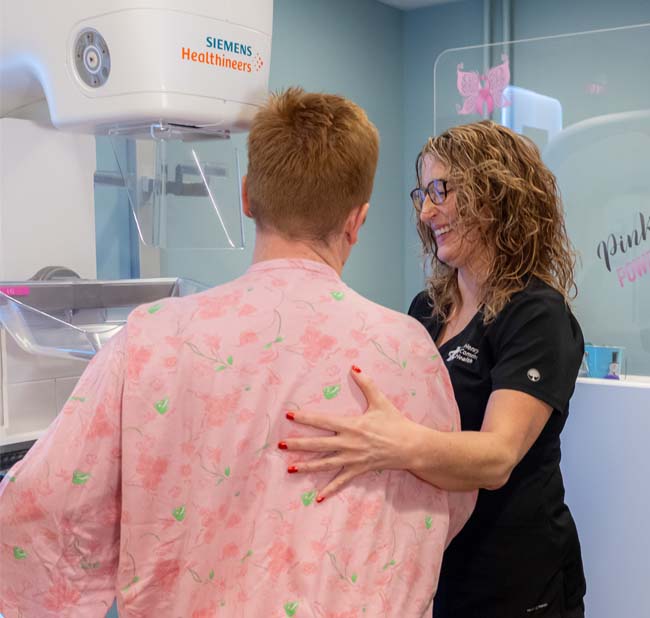October is known as National Breast Cancer Awareness Month and Henry Community Health wants to prepare you to take the first step and get a mammogram. We understand that mammograms, especially your first one, may feel scary or overwhelming when you don’t know what to expect. At HCH, we want all women to feel comfortable and confident walking into your first or your fifth mammogram appointment. To alleviate some of that worry, here are some commonly asked questions around mammograms!
What is a mammogram?
A mammogram is an x-ray exam that is used to check the breasts of individuals who have no signs or symptoms of disease. During the exam, your breasts will be compressed between two surfaces to spread out the tissue. This creates a sharper, clearer image while reducing your radiation dose.
Who do I go to if I think I have a breast problem?
If you find a lump or are experiencing something abnormal in your breasts, contact your women’s health physician to schedule an appointment or have a diagnostic mammogram ordered.
How long does a screening mammogram appointment take?
The entire procedure takes approximately 20 minutes but compression only lasts seconds for each breast.
What should I wear to my mammogram screening?
There aren’t many rules about what you can wear since you will receive a robe when you arrive. So, wear whatever makes you feel comfortable! Just don’t wear deodorant or powder as it can cause inaccurate mammogram results.
When should I start getting mammograms?
The American College of Radiology recommends annual screening mammograms beginning at age 40 for women of average risk, but earlier and more intensive screening for high-risk patients. Each individual is unique, so you should meet with your primary care or women’s health provider to discuss your risk factors for breast cancer and at what age you should begin getting mammograms.
Can I get a mammogram if I have implants?
Yes, individuals with implants can and should have a mammogram. The breast implants will be imaged to check for integrity and your natural breast will be imaged.
Can mammograms be replaced by ultrasound or thermography?
Ultrasound should not be used as a replacement or substitute for mammography. Many breast cancers may only be seen on mammograms and are the only proven tool to reduce mortality. Ultrasound is a useful tool when used in conjunction with mammograms.
Thermography is not a replacement or substitute for mammography. According to the FDA “Thermography has not been shown to be effective as a standalone test for either breast cancer screening or diagnosis in detecting early-stage breast cancer. In fact, the greatest danger from thermography is that those who opt for this method instead of mammography may miss the chance to detect cancer at its earliest stage”. The American Cancer Society states “Thermography has been around for many years, but studies have shown that it’s not an effective screening tool for finding breast cancer early. Thermography failed to detect 3 out of 4 cancers that were known to be present in the breast”.
How will you inform me of my results?
For all routine mammograms results will be mailed and will be available on your patient portal. Some primary care providers will follow up to explain those results over the phone, but a call doesn’t signify if you have an abnormality.
What does dense breast tissue mean and why is it important?
Having dense breast tissue is normal and common. It is important to know if you have dense breast tissue as it makes it harder to find breast cancer on mammograms and slightly increases your risk of developing breast cancer. Your result letter will inform you if you have dense breast tissue and for some individuals additional testing may be ordered. Talk to your healthcare provider about breast density and your situation.
Henry Community Health is here to be your partner in navigating your health journey. To schedule a mammogram, call your physician’s office or central scheduling at 765-521-1415.
